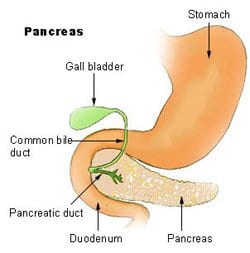 Understanding Your Pancreas: Some people don’t give their pancreas a second thought. The pancreas is a complicated organ. Not only does it produce digestive enzymes which break down the food you eat it also produces the hormones insulin and glucagon. Insulin and glucagon’s main function is to control the sugar levels in your body. It is essential that your body produces the correct amount of insulin. Problems with you pancreas could lead to problems with your insulin production which can lead to diabetes.
Understanding Your Pancreas: Some people don’t give their pancreas a second thought. The pancreas is a complicated organ. Not only does it produce digestive enzymes which break down the food you eat it also produces the hormones insulin and glucagon. Insulin and glucagon’s main function is to control the sugar levels in your body. It is essential that your body produces the correct amount of insulin. Problems with you pancreas could lead to problems with your insulin production which can lead to diabetes.
Your pancreas has a small section that is made of cells that are known as islets of Langerhans. This is because these cells sit in tiny groups which look like small islands. The hormones that these cells produce are secreted right into the blood flow by four types of cells. The beta cells which make up of 65% of the Iselts of Langerhans produce Insulin and Amylin. The alpha cells which are about 20% of The Iselts Of langerhans release glucagons. The Delta cells which make up anywhere between 3-10% of the cells produce somatostian and the PP cells which make up 1% produce Pancreatic polypeptide.
Insulin and glucagon are perhaps two of the most important hormones that the pancreas produces. They work to regulate the amount of sugar in your body so that it stays in a healthy range.
After you eat food, the carbohydrates that you eat are broken down into glucose and passed into your bloodstream. Your pancreas takes notice of this rise in blood glucose and starts to secrete the insulin. The insulin takes the glucose out of the bloodstream and puts it into cells. Once it is in the cells, it is used as energy to fuel cells while they are doing their different jobs. The other thing that happens is that it is stored in the liver or muscle cells as glycogen. Once the glucose level in the blood starts dropping off, the pancreas will stop producing insulin.
Glucagon has the opposite effect to insulin. When you work out, your muscles are using glucose for fuel and your blood glucose level drops. Once this happens, your pancreas notices the drop and will slow down the production of insulin and increase the production of glucagon. Glucagon is going to break down the stored form of glucose that is in the liver. This stored form is called glycogen. Once the liver breaks it down and releases the stored glucose back into the blood stream, the pancreas will then stop producing glucagon.
Diabetes is a problem that occurs when your body doesn’t produce enough insulin or the insulin that is produced does not work right. Sometimes your body might not respond properly to insulin. What ever the cause might be, how the body reacts is the same. Your body is going to try and get rid of the high glucose level how ever it can.
This is why it is so important to take care of your pancreas and your diet. Maintain a healthy diet and exercise routine to help prevent some forms of diabetes such as type II diabetes.